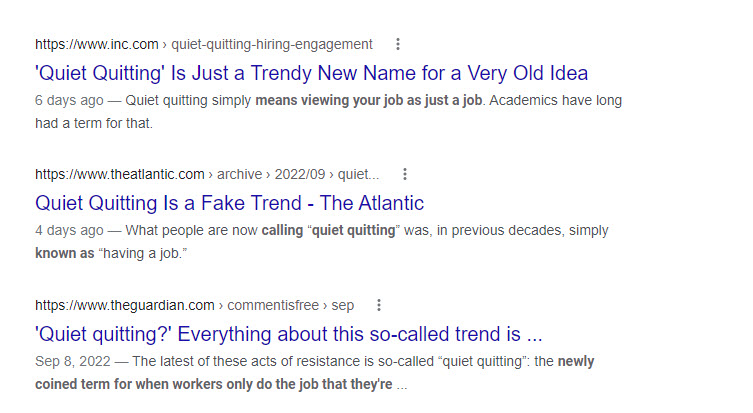
Like a lot of people out there when I first heard about “quiet quitting” I assumed people were just packing up their crap and sneaking out the back or maybe never coming back from their lunch break.
But it’s really just avoiding burnout and exploitation by only doing what you were hired to do during normal working hours. It’s a lot of what we’ve been talking about in our #NPCOMMLIFE posts for years.
Here is the TikToker credited with making it viral:
@zaidleppelin On quiet quitting #workreform ♬ original sound – ruby
As with most social media trends, people have thoughts.
Ariana Huffington said: “Quiet quitting isn’t just about quitting on a job, it’s a step toward quitting on life.”
She does go on to clarify if you aren’t engaged at your job, you should join the other big employment trend – The Great Resignation. But that still seems a bit dramatic to tell someone they have given up on life because they don’t want to stay at work late.
Kevin O’Leary is even more direct saying “You have to go beyond because you want to. That’s how you achieve success” in this video.
(Coincidence they were both born in the 1950s?)
And you can see from these search results that some people think the whole idea this is a new thing is ridiculous:

So how should you handle quiet quitting?
That depends entirely on your situation. I started this post fully expecting to say we should all be quiet quitting because:
- Enforcing boundaries is important.
- Having work-life balance is essential.
- Your employer should not be taking advantage of you.
- You should not be forced to tie your identity to your work.
All of those things are true. BUT it also oversimplifies many people’s situations.
The freedom to dial back your investment at work and not worry about the security of your job is a privilege in itself, and one that many people from marginalized identities don’t feel they can enjoy, even as work cultures shift.
Women – and especially women of color – have always been expected to do more than their male counterparts. The men get to attend lunch meetings with a big client and the boss while we get to plan the holiday party and order office supplies.
Yes, that is a workplace problem that should absolutely be addressed, but it’s still a reality that needs to be considered.
To get the attention they deserve, some people just can’t afford to not go above and beyond.
And also what if you genuinely like the hustle? You like stepping up. Or you look at new assignments as a way to learn and grow.
If you don’t subscribe to quiet quitting, are you going to be shunned as a “try hard” by the rest of your colleagues? I would hope not.
The truth is quiet quitters are nothing new. There are have always been those who do their work and nothing more. And there have always been those who want to be seen as go-getters. There is room for both of these work styles within an organization and they should both be valued.
I also think anything that furthers the conversation about work-life balance is a good thing. And while we can’t ignore the privilege behind it, the quiet quitting movement has certainly gotten people talking.
Here are some of our top posts on setting boundaries and work-life balance:






